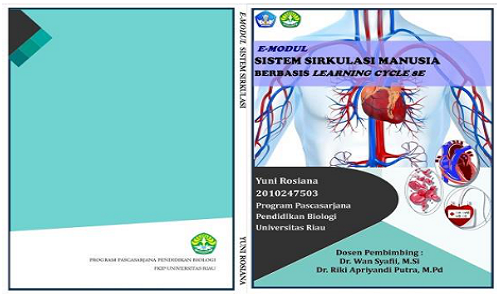
Effectiveness of E-Module Circulation System Based on 8E Learning Cycle on High School Student's Critical Thinking Ability
Abstract
Keywords
Full Text:
PDFReferences
Angelo, T. A. (1995). Classroom Assessment for Critical Thinking. Teaching of Psychology, 22(1), 6-7.
Asrial, A., Syahrial, S., Maison, M., Kurniawan, D. A., & Piyana, S. O. (2020). Ethnoconstructivism e-Module to Improve Perception, Interest, and Motivation of Students in Class V Elementary School. JPI (Jurnal Pendidikan Indonesia), 9(1), 30-41.
Arikunto, S. (2019). Prosedur Penelitian Suatu Pendekatan Praktik.
Br Tarigan, Y., Amir, H., & Ginting, S. M. (2022). Pengembangan e-Modul Berbasis Learning Cycle 7e Pada Materi Larutan Penyangga. Alotrop, 6(1), 62-69.
Evandewi, V. R. (2016). Peningkatan Hasil Belajar dan Kemampuan Berpikir Kritis Siswa Kelas III C pada Materi Perkalian dan Pembagian Melalui Model Pembelajaran Kontekstual di SD Negeri Perumnas Condongcatur. Skripsi Thesis. Tidak Diterbitkan. Depok: Universitas Sanata Dharma..
Hannum, F. (2017). Pengembangan Modul Fisika Berbasis Learning Cycle 5e Untuk Meningkatkan Kemampuan Berpikir Analitis Siswa (Doctoral dissertation, UNS (Sebelas Maret University)).
Jumiati, J., & Sintia, W. E. (2017). Pengaruh Model Discovery Learning Berbantuan Cooperative Integrated Reading And Composition (Circ) Terhadap Kemampuan Berpikir Kritis Siswa Pada Materi Sistem Sirkulasi Kelas Xi Sma N 11 Pekanbaru Ta 2016/2017. Bio-Lectura: Jurnal Pendidikan Biologi, 4(1).
Kemendikbud. (2013). Pengembangan Kurikulum 2013. Kementerian Pendidikan dan Kebudayaan. Jakarta.
Mahardika, E., Nurbaity, N., Ridwan, A., & Rahmawati, Y. (2018). Analisis Struktur Kognitif Siswa Dengan Metode Flowmap Dalam Materi Asam Basa Menggunakan Model Learning Cycle 8E. EduChemia (Jurnal Kimia dan Pendidikan), 3(1), 51-65.
Mustofa, R. F. (2018). Pengaruh Pembelajaran Learning Cycle 5e terhadap Kemampuan Berpikir Kritis dan Hasil Belajar. Bioedusiana: Jurnal Pendidikan Biologi, 3(2), 51-58.
Purwati, R., Hobri, H., & Fatahillah, A. (2016). Analisis Kemampuan Berpikir Kritis Siswa dalam Menyelesaikan Masalah Persamaan Kuadrat pada Pembelajaranmodel Creative Problem Solving. KadikmA, 7(1), 84-93.
Sugiharti, S. D., Supriadi, N., & Andriani, S. (2019). Efektivitas Model Learning Cycle 7e Berbantuan E-Modul untuk Meningkatkan Kemampuan Berpikir Kritis Peserta Didik SMP. AKSIOMA: Jurnal Program Studi Pendidikan Matematika, 8(1), 41-48.
Sugiyono, M. (2018). Metode Penelitian Kuantitatif, Kualitatif dan R&D. Bandung: Penerbit Alfabeta
DOI: http://dx.doi.org/10.31258/jes.7.3.p.434-441
Refbacks
- There are currently no refbacks.
Copyright (c) 2023 Yuni Rosiana, Wan Syafii, Riki Apriyandi Putra, Dedi Futra

This work is licensed under a Creative Commons Attribution 4.0 International License.
Publisher: FKIP Universitas Riau












